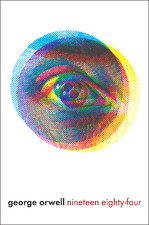 1984
1984
Dystopian fiction
Houghton Mifflin Harcourt
June 8, 1949
digital
613

THE STORY:
Winston lives in a dystopian society in the year 1984, or what he thinks is 1984. Winston is actually unsure of the year because all history can be altered to suit the needs of the Party. In fact, his job is to rewrite the predictions of news and make the predictions correct. He lives in Oceania, which always seems to be at war with another country. When Winston decides to buy a diary, which is illegal, his rebelliousness nature is suddenly awoken. He actively aspires to overthrow the government. However, if he is caught thinking such unorthodox thoughts by the Thought Police, he will be tortured and executed. Escaping the thought police is a troublesome task, for telescreens scrutinize every movement, sound, and expression.Winston realizes that being caught and tortured is inevitable. Although the future seems rather hopeless, Winston is aware of a secret society dedicated to the downfall of the Party. This organization is called The Brotherhood. Winston is oblivious to how joining the organization works. Meanwhile, he is also looking for answers about the past, so he strolls through a slum and asks an old man in a bar questions regarding his experiences before the Party usurped the old government. The man was unable to answer in a useful way, and Winston came to the dismal conclusion that the poor people of Oceania, known as proles, were too ignorant to rebel against the Party. Winston leaves disappointed, but he discovers a woman was following him. At first, Winston suspects she is with the Thought Police, but he later learns that her name is Julia and she liked him. Winston and Julia see each other often out of love and rebellion against the Party, and then, things take a turn for the worst.
Daniel Israel
Period 1, Mr. Oncay
Book Review: Fall ‘13
5/28/14
REVIEW: 1984 by George Orwell
MY OPINION:
George Orwell’s masterpiece, 1984, is written with a very gloomy tone. After finishing the book, I felt emotionally scarred because it is immensely dark and depressing. Despite its sorrowful ending, I think it contains a very powerful message that, amazingly, is still very relevant. 1984 warns the reader of the dangers of capitalism and what can become of it. The telescreens and constant monitoring remind me of the NSA, and Oceania and the United States both seem to constantly be at war. Of course, thankfully, our society has not quite reached the state that is described in 1984. This book is mostly for adults eighteen years old and up, but anyone can read it. The main issue for younger readers is the vocabulary used. I highly recommend using the electronic version of the book or have a dictionary ready. I rate this book ten out of ten stars. It is easily the best book I have ever read, and it would be on a list among the greatest books of all time.
STUDY QUESTIONS AND VOCABULARY:
FIRST SECTION
1. How was the Thought Police monitoring people?
1a. Through telescreens that recorded video and audio. (16)*
2. What are the three slogans of the Party?
2a. WAR IS PEACE
FREEDOM IS SLAVERY
IGNORANCE IS STRENGTH (20)
3. Why was Winston’s writing in the diary a momentous decision?
3a. Diaries were punishable by death. (25)
4. What happens after one commits a Thoughtcrime?
4a. The person disappears during the night and is wiped from existence. (49)
5. Why did Winston believe his mother and sister’s death were his fault?
5a. He dreamed of a sinking boat that he escaped, but they drowned. (70-74)
contrived (16)
compendium (39)
impedimenta (54)
palimpsest (92)
camaraderie (177)
MIDDLE SECTION
1. Why was the woman following Winston?
1a. She was in love with him. (227)
2. How did Winston and Julia meet?
2a. After Julia secretly hands Winston her message of love, through a series of complicated plans, they manage to meet in a clandestine location. (237-248)
3. How did Winston treat his mother and sister?
3a. Very poorly. He was frequently eating their food. On the day they disappeared, Winston stole his sisters bit of chocolate. (332-338)
4. Who admitted Winston and Julia into the Brotherhood?
4a. An Inner Party member named O’Brien. (353 )
5. According to the book Winston received from the Brotherhood, what was the purpose of perpetual war?
5a. Having an outlet for the continuous consumption of product to be used without the elevation of living standards allows the poor to continue to be oppressed, which preserves social classes.
(388)
intermittently (241)
gratuitous (285)
sordid (335)
persiflage (361)
diminution (399)
LAST SECTION
1. What is “doublethink”?
1a. Doublethink is the ability to alter your own memories and opinions that contradict the Party’s values, so they are in agreement with the party and then possibly change them back. It is a way of mentally cheating.(443-451)
2. Why is time insignificant in the Ministry of Love?
2a. The lights never turned off. (481)
3. Who is O’Brien?
3a. O’Brien is an Inner Party member, not a member of The Brotherhood, which might not exist. He was in charge of torturing Winston. (495)
4. What was in Room 101 for Winston? Why?
4a. Rats. Winston hated rats, so they used them to force him to say that he would rather inflict the pain on Julia. The result is that he realizes he doesn’t love her. (589-590)
5. Why does Winston love Big Brother in the end?
5a. Winston loses his emotions and concept of love while being tortured. All he understood was pain. In the end, Winston does not love Big Brother in a traditional sense, but he finally surrenders to him and accepts him because he realizes the Party cannot be stopped. At the same time, he starts to fantasize death. (613)
avaricious (425)
inimical (440)
desultorily (481)
prevaricate (508)
didactically (589)
* page numbers out of 613